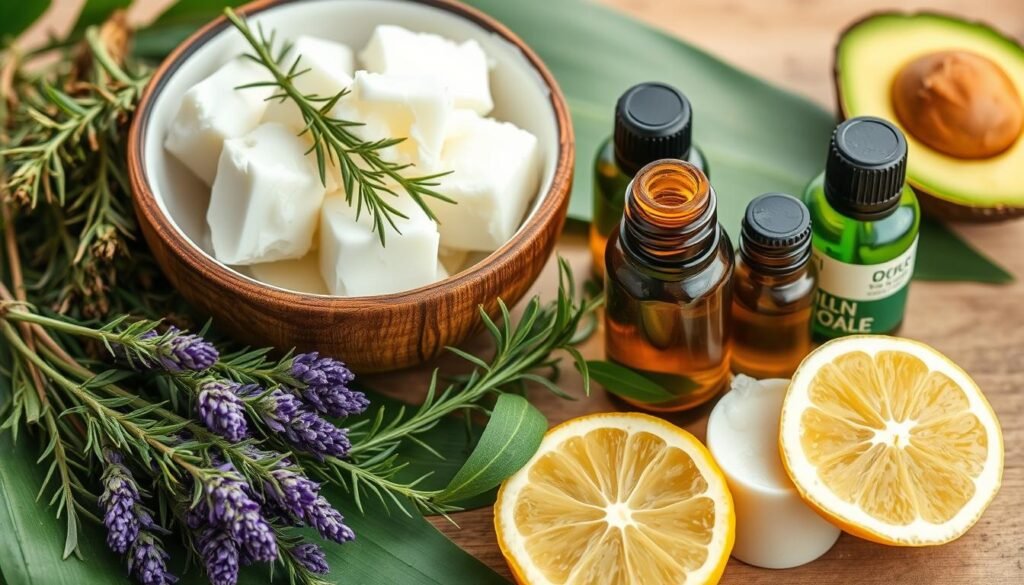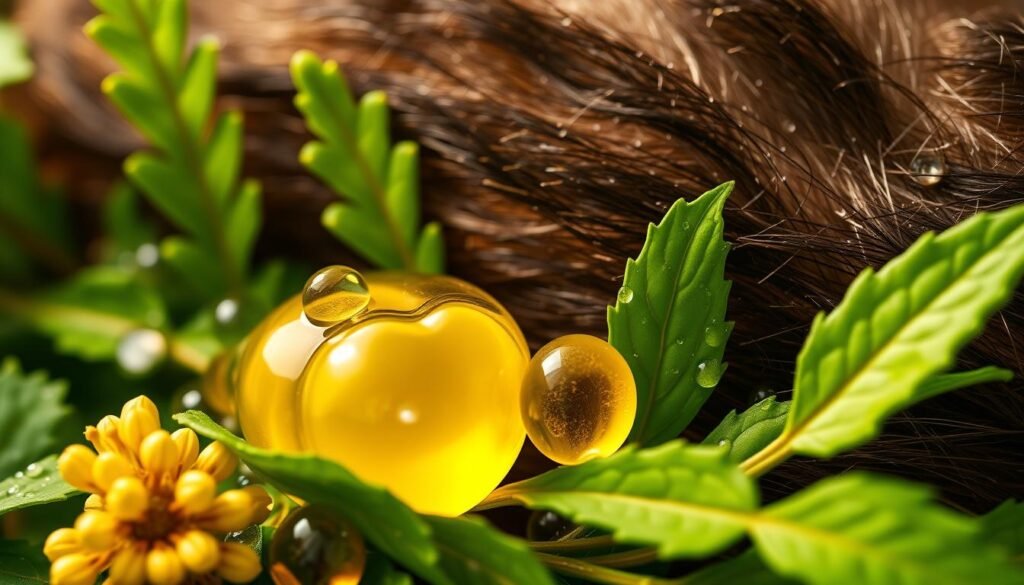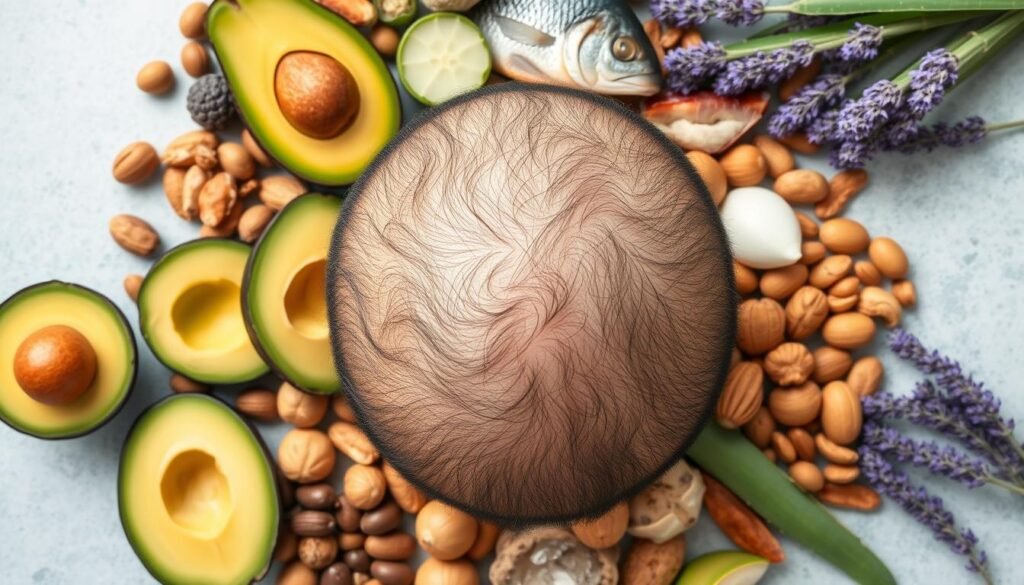Did you know nearly half of all people will face dandruff once? This widespread issue, with its itchy and flaky scalp, brings discomfort to many. The reasons behind a flaky scalp are varied and complex. Yet, the link between fatty acids and scalp health is key. It shows potential for natural relief.
This guide aims to show how certain nutrients, especially fatty acids, can improve scalp health, lessen inflammation, and boost overall health. It stresses natural remedies like coconut oil and omega-3 fatty acids. The importance of picking the right products and keeping the scalp clean is also covered. For more on easing an itchy scalp and related issues, check out itchy scalp remedies.
Key Takeaways
- Fatty Acids play a crucial role in maintaining scalp health.
- Natural remedies can alleviate symptoms of flaky scalp effectively.
- Maintaining proper scalp hygiene is essential for managing dandruff.
- Incorporating omega-3 and omega-6 fatty acids into the diet can support skin health.
- Understanding the triggers of scalp conditions is vital for effective treatment.
Understanding Flaky Scalp and Its Causes
Nearly half the adults worldwide face flaky scalp conditions, often called dandruff. Knowing the Symptoms of Flaky Scalp helps people recognize and tackle this widespread issue.
Common Symptoms of Flaky Scalp
The main Symptoms of Flaky Scalp are itching and seeing white or yellow flakes. These flakes might also appear on your clothes, causing embarrassment. In worse cases, the skin may get inflamed, affecting daily life and confidence.
Factors Contributing to Flaky Scalp
Dry skin and seborrheic dermatitis are major Causes of Flaky Scalp. Dry skin leads to irritation and flaking. Seborrheic dermatitis also affects the face and body, worsening in adults aged 40 to 60.
Too much Malassezia yeast on the skin is another key factor. Stress, weather changes, and certain hair products can make it worse.
| Age Group | Incidence Rate | Gender Prevalence |
|---|---|---|
| Infants (0-3 months) | Up to 42% | N/A |
| Adolescents (puberty) | 3-5% | Higher in males |
| Adults (20-60 years) | 1-3% | 3.0% in men, 2.6% in women |
What Are Fatty Acids?
Fatty acids are key for many body functions, especially for the skin and scalp. They keep the skin’s barrier healthy and hydrated. This stops skin flakiness. Omega-3 and Omega-6 fatty acids are especially noted for their benefits.
Types of Fatty Acids: Omega-3 and Omega-6
Omega-3 and Omega-6 fatty acids do different things for our bodies. Omega-3s are in fatty fish, flaxseeds, and walnuts. They fight inflammation and can soothe a flaky scalp. Meanwhile, Omega-6s come from vegetable oils. They are key for skin health and keeping it hydrated.
Role of Fatty Acids in Skin and Scalp Health
The right balance of Omega-3 and Omega-6 is crucial for a healthy scalp. The wrong ratio can cause inflammation and other issues. Fatty acids also aid in sebum production. This keeps the scalp moisturized and fights dandruff.
Studies show that dandruff and seborrheic dermatitis might be linked to the fungus Malassezia. This fungus grows in too much sebum. Getting enough Omega-3 fatty acids can help manage these scalp conditions. Read more here.
| Fatty Acid Type | Sources | Benefits |
|---|---|---|
| Omega-3 | Fatty fish, flaxseeds, walnuts | Reduces inflammation, supports scalp hydration |
| Omega-6 | Vegetable oils, nuts, seeds | Maintains skin hydration, promotes healthy sebum production |
Fatty Acids and Flaky Scalp: A Connection to Explore
Fatty acids are key for a healthy scalp. They help make more sebum, which keeps your scalp moist. Omega-3 and omega-6 fats are really important in this process.
How Fatty Acids Improve Sebum Production
Daily, our scalp makes about 1-2 grams of sebum. This keeps our scalp hydrated and protected. Fatty acids boost sebum production, making sure our glands work right. This helps keep our scalp from getting dry and flaky.
Impact on Scalp Dryness and Irritation
Without enough sebum, your scalp can get dry and irritated. Sebum has unsaturated parts that can oxidize and cause inflammation. This is not good for your scalp. But, the right mix of fatty acids can keep your scalp healthy, easing irritation and flakes.
Natural Remedies for Flaky Scalp
Looking into natural remedies for flaky scalp means trying out different methods. Essential oils and hydrating elements can boost scalp health. They help soothe dryness and irritation.
Essential Oils for Scalp Health
Essential oils are praised for their healing effects on the scalp. Two key oils stand out:
- Coconut Oil: Loaded with lauric acid, it fights microbes. It hydrates the scalp well, easing dandruff problems.
- Tea Tree Oil: Known for fighting germs and fungus, tea tree oil is a strong dry scalp remedy. It’s found in many dandruff shampoos.
Mix tea tree oil with castor oil and aloe vera gel for a soothing homemade treatment.
Moisturizing Ingredients to Consider
Other than essential oils, certain compounds can keep your scalp moisturized, reducing flaky skin:
- Aloe Vera: It hydrates well, calming irritated skin and leading to a healthier scalp.
- Apple Cider Vinegar: Diluted with water, it lessens itchiness and cleans off residue.
- Honey and Avocado: Combined, they form a mask that moisturizes deeply with fats and vitamins.

Scalp health gets a big boost from using natural remedies for flaky scalp. It’s about blending essential oils with moisturizing ingredients. Together, they fight off dryness and irritation successfully.
The Benefits of Omega-3 Fatty Acids for Scalp Health
Omega-3 Fatty Acids are key in improving scalp health. They fight inflammation, helping with dryness and irritation. Adding them to your diet can make your scalp and hair healthier. You’ll see less flakiness and feel more comfortable.
Sources of Omega-3 Fatty Acids
There are many good sources of Omega-3 Fatty Acids you can add to your meals. These include:
- Fatty fish like salmon, mackerel, and sardines
- Flaxseeds and flaxseed oil
- Chia seeds
- Walnuts
- Hemp seeds
Americans spend more than $1 billion each year on fish oil supplements. This shows how much they’re sought after. The European Food Safety Authority says taking up to 5,000 mg a day is safe.
How Omega-3s Help Reduce Inflammation
Omega-3 Fatty Acids are great for fighting inflammation. This is good news for anyone with a dry, flaky scalp. People who took fish oil saw their hair grow more and lose less. Using omega-3s on the scalp can also make your hair shiny. This points to a healthier scalp.
To sum up, adding Omega-3 Fatty Acids to your diet can do wonders for your scalp. It tackles inflammation and makes dryness a thing of the past.
The Role of Omega-6 Fatty Acids in Managing Dandruff
Omega-6 Fatty Acids are key for a healthy scalp and dandruff control. Adding them to your diet helps your skin and lowers inflammation. This can make flaky scalp issues better. Knowing where to get Omega-6 Fatty Acids is a step toward fighting dandruff.
Common Sources of Omega-6 Fatty Acids
You can find Omega-6 Fatty Acids in many foods. So, adding them to daily meals is simple. Here are some main sources:
- Vegetable oils (such as soybean, corn, and sunflower oil)
- Nuts (including walnuts and pine nuts)
- Seeds (like pumpkin and sesame seeds)
- Meat and dairy products
These foods offer the nutrients your scalp needs. They help manage Dandruff well.
Balancing Omega-3 and Omega-6 Intake
It’s important to balance Omega-3 and Omega-6 Fatty Acids for your scalp. Omega-6 helps the skin barrier, while Omega-3 reduces inflammation. Getting the Balance right fights dandruff causes, like Malassezia growth. These fatty acids work together to keep skin healthy and strong.

Anti-inflammatory Oils to Soothe a Flaky Scalp
Dealing with a flaky scalp can be annoying. Luckily, nature has answers like Coconut Oil and Tea Tree Oil. They are full of Flaky Scalp Relief powers. Adding these oils to your care routine can make your scalp healthier.
Coconut Oil: A Natural Moisturizer
Coconut Oil shines as a moisturizer. It’s packed with lauric acid, which fights germs and calms inflammation. It keeps the scalp moist, balancing the natural oil levels.
It prevents dryness by holding in moisture. This is key against too much shampooing which removes important oils.
Tea Tree Oil: Antimicrobial Benefits
Tea Tree Oil is a must for flaky scalps. Its antibacterial qualities manage oil levels and tackle dandruff. By fighting off bad microbes, it helps your scalp stay healthy. People see their scalp condition get better, feeling more comfortable and looking good.
| Oil | Properties | Benefits for Flaky Scalp |
|---|---|---|
| Coconut Oil | Moisturizing, Antimicrobial | Soothes irritation, Hydrates |
| Tea Tree Oil | Antimicrobial, Anti-inflammatory | Regulates oil production, Fights dandruff |
Using Anti-inflammatory Oils can boost your scalp’s health. These oils bring comfort and lessen dryness and irritation. They show just how good natural ingredients are. For more info on oils for dry scalp, check out this article.
Enhancing Scalp Health Through Diet
Eating right is key for a healthy scalp. By picking good foods and avoiding bad ones, you can really help your scalp. It’s important to eat foods rich in omega-3 and omega-6 fatty acids.
Foods Rich in Fatty Acids
Eating certain foods can improve your scalp health. These foods give you the fatty acids and nutrients your scalp needs:
- Fatty fish: Fish like salmon, mackerel, and sardines are great for scalp moisture because they’re full of omega-3.
- Nuts and seeds: Foods like walnuts, flaxseeds, and chia seeds have omega-3 and zinc, which help keep your scalp hydrated.
- Avocados: Packed with good fats and vitamin E, avocados help your scalp stay moist.
- Leafy greens: Spinach and kale help make natural oils, keeping your scalp healthy.
- Eggs: Rich in protein and biotin, eggs make your hair strong and improve scalp health.
- Sweet potatoes and carrots: These foods are full of beta-carotene, which is good for a healthy scalp.
- Berries: Berries protect your scalp with their antioxidants.
- Oysters: These are good for reducing scalp dryness and flakiness because they have zinc.

Foods to Avoid for Better Scalp Condition
For a better scalp, cut back on certain foods:
- Sugary foods: They can cause inflammation, making your scalp dry.
- Processed foods: These can make your scalp dryer with their bad fats and preservatives.
- Alcohol: Drinking too much can dry out your scalp.
- Caffeinated drinks: Cutting down on caffeine helps your scalp stay hydrated.
Learn more about how your diet affects dry scalp by reading this diet guide.
Creating a Scalp Care Routine
Starting a good Scalp Care Routine is key for a healthy scalp. It helps with issues like dandruff and dryness. Finding the best Shampoo Frequency for your hair and scalp is the first step.
When to Shampoo to Maintain Scalp Health
Washing your hair regularly is crucial. If you have an oily scalp, you might need to wash it three to four times a week. But if your scalp is dry, shampooing just once a week might be enough. It’s smart to use shampoos without sulfates to keep natural oils and avoid dryness.
Choosing the Right Products for Dandruff Management
Choosing the right products is very important for controlling dandruff. Shampoos with salicylic acid are good because they gently exfoliate the scalp. Using oil-based treatments can also remove buildup and keep your scalp moist. Steer clear of products with bad alcohols like ethanol that can aggravate your scalp. Adding a humidifier, as suggested by studies, helps keep the air moist, benefiting your scalp.
Massaging your scalp with warm oils like coconut or argan oil helps keep moisture in and soothes the skin. Products like CRLab | Oil Non Oil and Living Proof | Scalp Care Density Serum are top picks for healthy scalps.
| Product Type | Recommended Ingredients | Avoid |
|---|---|---|
| Shampoo | Salycylic Acid, Tea Tree Oil | Sulfates, Alcohols (Ethanol, SD Alcohol) |
| Scalp Treatment | Oil-based Treatments (Coconut, Argan) | Harsh Chemicals |
| Serum | Living Proof | Scalp Care Density Serum | Dry Shampoos (Excessive Use) |
Putting these steps into action in your scalp care routine can improve scalp health. This can lead to better hair growth.
Conclusion
It’s important to know how fatty acids help with flaky scalps. Nearly half of all people face dandruff issues after puberty. This makes it key to use natural methods and make better lifestyle choices for scalp health.
Adding omega-3 and omega-6 fats to your diet helps a lot. They make sebum better, cut down on redness, and keep the scalp moisturized.
Using natural oils that fight inflammation helps too. Also, having a regular routine for scalp care works wonders. Eating foods high in fatty acids boosts these efforts. Staying away from certain foods can also make a big difference. All this helps create a scalp that’s healthier and less likely to get dandruff.
In short, use fatty acids every day with smart eating and a good scalp care plan for less flakiness. By knowing what causes the problem and acting on it, a healthier scalp is possible.